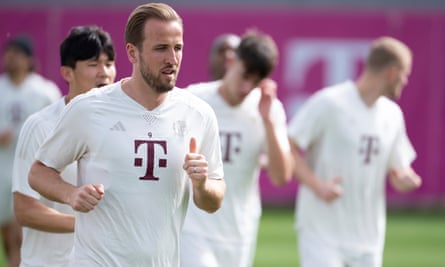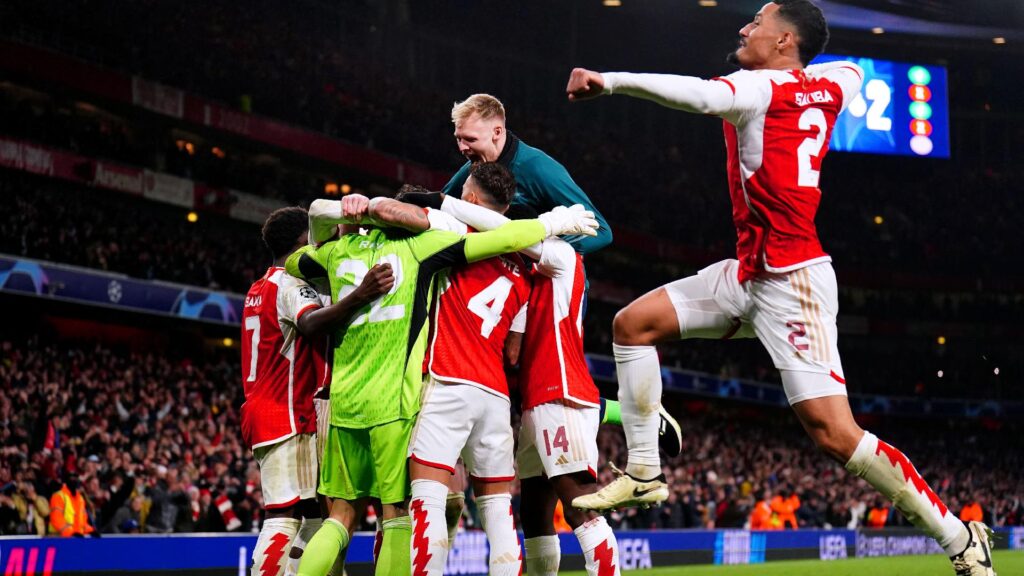There was barely a flicker of expectation among Arsenal fans before Bayern Munich’s most recent visit, in March 2017. Among a few hundred, there was active disdain: a march to the Emirates from Avenell Road, where the facade of Highbury’s art deco-fronted east stand remains, that featured banners calling for Arsène Wenger to terminate a long but fading tenure. Within three hours those placards were being brandished inside the ground by the masochistic souls who had stayed to the end of another 5-1 defeat, a third successive shaming by that scoreline against the serial Bundesliga champions. This should have been a meeting of continental powers; instead it was another sheer embarrassment.
On Tuesday the same supporters will bounce into the stands. It is much too soon to state the tables have turned entirely but, for the moment, Arsenal and Bayern have seen their situations flip around. A slick, clinical, tightly drilled machine will face an erratic, porous side filled with gifted but mercurial individuals and helmed by a manager whose time is almost up. The fact Mikel Arteta’s team can claim to be the first of those, and will enter this quarter-final tie as slight favourites, would have appeared unthinkable when Arturo Vidal completed the rout to boos and an emptying of the stadium seven years ago.

Arsenal’s biggest Champions League game since 2010 is not fraught with the hopelessness that surrounded their last appearance at this juncture. Back then they were delighted to overhaul a 2-0 lead established by peak Guardiola-era Barcelona in the home leg, having hardly been given a kick for the first hour, but barely had a prayer at the Camp Nou and were demolished by four goals from Lionel Messi. Reasons to be fearful are fewer this time and Arteta has realistic hope of bringing a lead to Bavaria next week: Bayern have conceded at least twice in each of their past six domestic away games and, at a modest Lazio in the last 16, they flailed to defeat by the odd goal.

Perhaps they do not hold the mystique of old. Arteta was on Arsenal’s books as a player only for the first of the 5-1s and was not involved that day, but he did start against them three times during that period in the mid-2010s when these clubs seemed magnetically attracted. Looking across the halfway line towards Philipp Lahm, Bastian Schweinsteiger, Arjen Robben, Franck Ribéry, Thomas Müller, Toni Kroos and colleagues before kick-off it was impossible not to sense an aura.
“It’s that presence and security that they transmit within their body language,” Arteta remembered. “Because they’ve done it and have the reassurance that they can do it again, and that’s really important. That team, as well, had some world champions and they were tough.”
Müller and Manuel Neuer are still around to spread some of that gravitas; perhaps it should not be forgotten, either, that in Kingsley Coman the visitors have a player who has settled a Champions League final in Bayern’s favour. Even in turbulent times a club of their stature may keep hold of themselves through such lineage: Bayern can take to the Emirates pitch with some form of muscle memory, a belief in their institution’s ability to pull through on the biggest stage, that Arteta knows has been hard won.
“They have experience and have gone through a lot of those moments and that is in their history,” he said. A six-time winner of Europe’s biggest prize will, after all, be facing a club still to break its duck. How can Arsenal acquire the confidence that oozed from those Bayern players who routinely bested them? “Winning,” Arteta replied. “Winning and winning and winning, being more sure about yourself, and with experience.”

Arteta was in little mood to bite on the Harry Kane factor. The sight of their former Spurs nemesis is arguably more likely to be kryptonite for his players than any glimpse of the Bayern shirt. Kane scored 14 goals in 17 Premier League appearances against Arsenal, although it is worth saying only four of them came in the last seven. His 38 goals for Bayern have rendered him largely exempt from the opprobrium dished out among struggling colleagues. Given Kane’s well-documented personal mission to lift the Champions League trophy, the identity of the opponents aiming to stop him will surely imbue his night with added edge.
“He’s got the service and players around him to provide those opportunities; this is what we have to try to avoid,” was Arteta’s only substantial answer on that topic. He will know Arsenal are in better shape than ever to stop Kane: in their 11 top-flight matches since the turn of the year, they have conceded four times and their expected goals tally against has numbered just under five. The figures show their meanness is not simply an externally driven narrative: they are in exactly the kind of rhythm Arteta himself says breeds success.
While the Emirates was half‑full by the time Bayern pulled clear last time around, on Tuesday it will hold more Arsenal fans than ever after away supporters were banned for misbehaviour during previous ties. It is another point of polar opposition to those dark days and Arteta was, as usual, not shy to hype the crowd’s potential influence. Nobody can take those multiple thrashings away from Bayern but Arsenal can reduce them to layers in the sand. “That’s their history and they have earned it,” said their manager, who stands no chance of being subjected to protests any time soon. “We have to create our own one.”








More Stories
Amorim insists Fernandes not leaving Manchester United amid Madrid reports
How debt burden pushed Nigerian boxer Segun Olanrewaju to a fight that took his life
Nigeria Taekwondo Federation boss, Abdullahi Saidu dies at 53